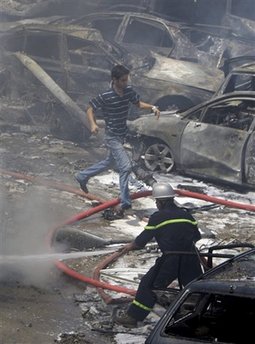Baghdad Bombings Threaten Escalation
Just as we’re starting to ignore Iraq and refocus our attention on Afghanistan, things are getting very dicey again:
A series of explosions targeting government and commercial buildings struck Baghdad Wednesday, killing at least 75 people and wounding more than 300, Iraqi police and medical officials said.
The blasts in the capital followed a string of attacks in Iraq this month that have claimed hundreds of lives and raised concerns about the ability of Iraqi security forces to keep the lid on violence in advance of an American withdrawal.
The deadliest was a car bomb near the foreign ministry, which killed at least 59 people and wounded 250. Officials said the toll may climb as rescue workers continue to search through rubble and debris. The ministry is close to the fortified Green Zone. The officials all spoke on condition of anonymity because they were not authorized to release the information.
Sadly, the terrorists will likely always have the capability to wreak havok in this manner. That’s true even in very secure societies, with Israel being the most obvious example.
We’ll simply never be able to withdraw from Iraq if perfect security is the benchmark. It’s in our interest to continue to provide logistical and technical support indefinitely; but we’ve past the point where a continued large scale military presence will provide additional benefits.





There was a few items out the other day that I merely skimmed…the gist was that Iraq, in their next elections, could vote us out. If this indeed the case, we may not have to worry about our benchmarks.
I’m surprised that the news media mentioned Iraq at all. The U. S. casualty count there isn’t enormously different from what a comparably-sized force stateside would have been (75/100,000/year). Iraqi casualties are not as low as we might wish but they’re still below what they were three years ago when strings of deaths like those being reported happened every single day.
You’re right, James. We’ll need to provide logistical and technical support for some time to come but it’s time for most of our force in Iraq to go. Unfortunately, some of them will go to Afghanistan. I’m still waiting for the White House’s strategic assessment of Afghanistan.
Indefinitely? I would much rather we put contingencies on our staying. Rather than asking to stay, I want them to ask us to stay. We should set goals that they need to achieve if they want us to stay. I do not really want to stay and spend billions if things are not going to be the same 15 years from now.
Steve
“Sadly, the terrorists will likely always have the capability to wreak havok in this mannerâ€
It is true in the same manner as crime that you can’t prevent all terrorist attacks. However you can greatly reduce it. Defensive measure results in very little return for the buck. Offensive measures are much more effective. Understandably offensive measures are much less political feasible and people get squeamish with that.
As long as you are not allowed to go after the source especially outside finance and training source, we will not make much headway. Yes local groups are extremely hard to weed out but if you ever tried to run an insurgency without outside financing or somewhat safe training areas, you will know it greatly impacts your operational abilities. As long as Iran, Syria, etc can support these terrorist groups with little consequences on their part, we won’t have that great of impact on these events even if we greatly increase the number of troops in Iraq or Afghanistan.
These attacks aren’t threatening the fundamental integrity of the regime to maintain control in Iraq, so I really just don’t care. Let the Iraqis handle them – considering the way they try and tie the hands of American troops still there, they obviously want to.
Brett
That is a viable option and I not against it. Just don’t complain too much when they don’t do it like we think should they do. Problem in today’s world is everyone want it perfect but are unable and\or unwilling to do it themselves.
And how, exactly, should we go after Syria and Iran…